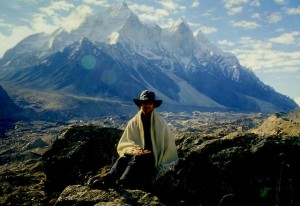This piece was originally published by our friends at Psyched in San Francisco Magazine. We share in their mission to “build a culture of well-being,” and appreciate the high quality information and advice they are offering to the public. Stay tuned for more content from our friends at Psyched in San Francisco Magazine!
Spring cleaning in the garage came to a premature halt the other day when I happened across a photo album from 1997.
That’s me there, sitting for some morning journaling in cool mountain air. I can still remember that moment. I ended up traveling and living in India for the next several years, learning things about myself and the world that I’m still digesting all these years later.
When you travel and live abroad for a prolonged period, not tied to a work schedule or family or the normal social pressures, you find there’s a surprising amount of time to fill. For me, always a reluctant student, it was a gift to discover that when no one is watching or grading my performance, I actually like to study!
It was through studying and living in a culture still connected to its ancient past that I began to realize how amazing it is to be human. There’s a Hindu proverb which says: To attain a human life is a great blessing.
Though history and the daily news reminds us that we are capable of terrible acts against ourselves and the rest of the living world, we are beautiful beings. By nature we are filled with profound questions, reflecting a deep longing to understand this mystery of life, and how best to take our place within it.
One of the central questions we can ask is: What does it mean to be human?
The mythologist and teacher, Joseph Campbell, had this to say: We became human (distinct from the many other animals that were so much like us) when we first began burying our dead. Why is the act of burial significant? According to Campbell it signifies the emergence of a distinctly human impulse: to acknowledge a specific life, to recognize that each one of us is unique and fundamentally irreplaceable.
By burying their dead our original ancestors separated themselves from other species, all of whom instinctually focused forward towards the next hunger or the next threat to preservation. We became human when we miraculously popped out of the forward pull of instinctual life, paused the flow of experience through some newly born reflective capacity, and looked back upon what has been, and what is no more. Telling stories, singing songs, commemorating events, gathering for seasonal festivals and rituals.
We humans are the part of nature that makes a conscious effort to remember, and to learn from our memories.
The capacity to reflect upon experiences and consciously remember what has happened may be the defining blessing/wound of the human condition. The ability to remember gives us an awesome power, the power to draw upon lessons of the past (i.e., not having to reinvent the wheel all the time), while simultaneously placing on us the terrible burden of realizing that everything (me, you and all that we care about) will disappear, leaving only a memory. What’s more, memory itself fades if it is not worked on and passed on.
If the strength and strain given to us with memory is our fate, then we do well to practice and get good at it.
All acts of remembrance are grounding cords, sacred to the soul. If a fire threatened my house, what would I hurry about trying to gather up and save? Personal items: the family photos, the journals, the shoebox holding a special childhood collection, mementos signifying important relationships and periods of my life. By keeping and protecting these artifacts I am faithful to their memory. I am faithful to my experiences, my values, my loved ones. Faithful to the dreams, the innocence and the agonies of my youth.
I find it humbling to pause and consider all that is taken for granted. I am contained, empowered, and defined by innumerable forces given to me with my first breath—so immediate they are immediately overlooked and forgotten.
I’ve come to believe that the reflective capacity to remember is the essence of what we humans call wisdom.
As the saying goes: Those who forget are destined to see history repeat itself. Memory draws the mind inward, tempering the instinctual forces that forever draw my attention outward towards the next worldly ambition. It is through memory and acts of remembering that I again recognize my place in the world, just as aborigines in Australia use songlines to guide themselves across expanses of wild territory, to find their way home again.
Listening to the news there is a growing concern these days about the perils of advanced computers and artificial intelligence. The worry is that our lives will play out like a science fiction nightmare, enslaved by the machines we built to make our lives easier.
But maybe the method of enslavement will be one we least expect. Perhaps with all our smart phones, remote cloud servers, and personal computer assistants the most basic human capacity, to remember, will atrophy. (Quick: What are the phone numbers of the four people closest to you?)
Perhaps, like the retreating glaciers, our capacity to hold essential memories for ourselves is already slipping away from us. Perhaps one day we’ll need Google or Facebook to tell us who we are, and our interest in deep searching questions will be reduced to Wikipedia entries.
What I love about therapy is that in the consulting room we are sheltered from the rest of life for an hour, with an opportunity to remember what has been left out, forgotten, or overlooked. We are just human travelers sitting together at the crossroads, relating, reflecting on questions with our intuitive, imaginative, and emotional capacities.
Often we’re dealing with a loss, or feeling lonely and confused. But most of all there’s that longing to feel connected to the roots of who we are, to remember that the path leading forward begins behind us, and is already there beneath us, if only we can slow down and remember how to recognize it.
~
~
~
Love elephant and want to go steady?
Sign up for our (curated) daily and weekly newsletters!
Editor: Travis May
Photo: Provided by author







Read 1 comment and reply